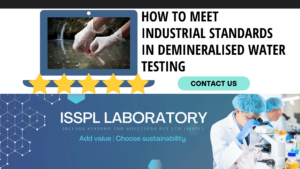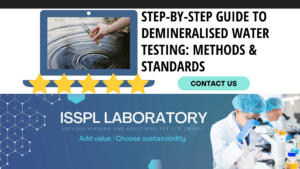An Overview by Team ISSPL - Analytical Testing Laboratory in India
ToggleAudit services are expansive, and a water audit is among the necessities in the current environmental circumstances. It is also known as a water assessment. A water audit is an end-to-end analysis of the water usage rate and amount of a business. It is essential to identify the various inefficiencies related to water consumption and the potential techniques for cost savings. The audit session helps you spot all the effective ways for a business to use water during operations. One can understand the reasons behind water wastage and utility, ensuring better chances to manage the exploitation of the natural resource.
Water audits assess a business’s past utility bills. It also checks the existing usage rate through water meters. One can generate precise data related to water consumption. Many businesses use more water than they need. Thus, it is the need of the hour to monitor and regulate water usage.
The types of water audit
There are two types of water audits – self-audits and professional audits. The self-water audits make it mandatory for the companies to review their own water usage over a time period. They need to document and analyze the data to spot effective ways to enhance operational efficiency. Professional water audits get conducted by the expert third-party auditing team. They specialize in evaluating an organization’s water usage. It helps develop an effective water conservation plan. Both water audits are effective, but the professional audits offer a comprehensive and deliver unbiased overview. One can make effective decisions based on professional water audit reports. Regardless of the audit type, the goal is uniform. One needs to save water, resources, time, and money without neglecting operational efficiency. There are several ways to minimize water consumption, and a comprehensive water audit resolves the need for finding effective measures for a business.
The benefits – What makes it apt for the business?
Audits are proactive and offer an analyzed outcome. You can get benefitted from the analysis, leading to the prevention of a future issue. It can also lead to an essential discovery in the operations that were neglected previously.
In many cases, organizations need to conduct an overall environmental audit. It is a comprehensive water audit, reviewing the water quality via industrial monitoring. Even if it is not mandatory, ensuring the best water utility helps save major costs, time, and potential worries for a business. An adverse situation can ruin the brand image, morale, and financial status. Thus, it is better to stay proactive with water management and meet the norms set by the Environmental Protection Agency. The significant reasons for auditing water quality include the following –
- Ensuring compliance with the law
- Adhere to permit regulations
- Find potential pollution
- Identify the strengths and weaknesses
- Save money and time
- Conserve industrial and natural resources
- Improve safety and minimize liability
- Exercise due diligence
- Remain proactive
- Create a comprehensive operational strategy
Several businesses apply for obtaining official recognition via the ISO or International Organization for Standardization. ISO exhibits and explains the ideal guidelines for best practices and management systems. The water audit can help acquire ISO 14001 certification. Companies can represent an impeccable international standard. Also, regular audits facilitate the examination process for your operations. One can identify trends or patterns of water usage to make effective and comprehensive strategies. Businesses can use financial, regulatory, and energy audits, to ensure the best practices.
- Enjoy reduced rates – It is better to identify the exact figures and how much water you are using. One can ensure the most economical tariff by regulating the usage. With the increasing water rates for businesses, one needs to compare the rates for an effective deal. Thus, you can manage everything without neglecting efficiency. It helps in long-term operations.
- Obtain Green Credentials – Currently, environmental issues are relevant among all industries. One must find an effective plan to navigate future fines and sanctions. It is necessary to review the excess carbon emission rate. Consumers are seeking out ‘green businesses’ and attaching better brand values to such organizations. Amplify the prospects and hold your share in the market to attract new customers by making an eco-friendly move. Reducing water usage or reviewing the ways to minimize wastage are effective. It is part of the green strategy. One can eliminate the negative impacts of industrial operations on the environment by incorporating your green credentials into the PR and marketing strategy.
- Impactful for brand reputation – All businesses must recognize the need to market the pros of green business and resource sustainability. Making an active effort for minimizing water exploitation and resources exhibits a responsible overview. One can reduce the chances of brand negativity and ensure the best ways for gaining the trust of stakeholders.
- Operational Efficiency and Maintenance – One can ensure efficient management of water and streamline operations. It eliminates the chances of unnecessary water wastage. Water audits also help you recognize potential or active leaks. One can make better decisions and fix the issues before it gets too late or expensive to repair. Water reductions can vouch for long-term gain and enhance the resources and infrastructure.
Ensure the best water-saving strategies – With training.
Implementing water conservation is effective when those participating in the process can recognize the essentiality of water audits. Educate and train employees on best water management practices. An engaging learning experience helps you find an effective way with enhanced proactiveness. Be proactive with the water conservation goals via regular metering and waste maintenance. Implement various strategies to reuse the water like – water cooling towers, rainwater catchment systems, grey water for irrigation, etc. Assess the costs of new pumps, plumbing, etc., and manage the resources wisely without exploiting the budget. All these are possible when employees are part of the active process and obtain relevant information about the water audits.
Closing note – Promote a green business
Conducting regular water audits and reducing your water usage amplifies business prospects. From reduced costs to adhering to consumer demands, the advantages are extensive for a green organization. Choose professional audit resources and testing facilities with the top service providers.







